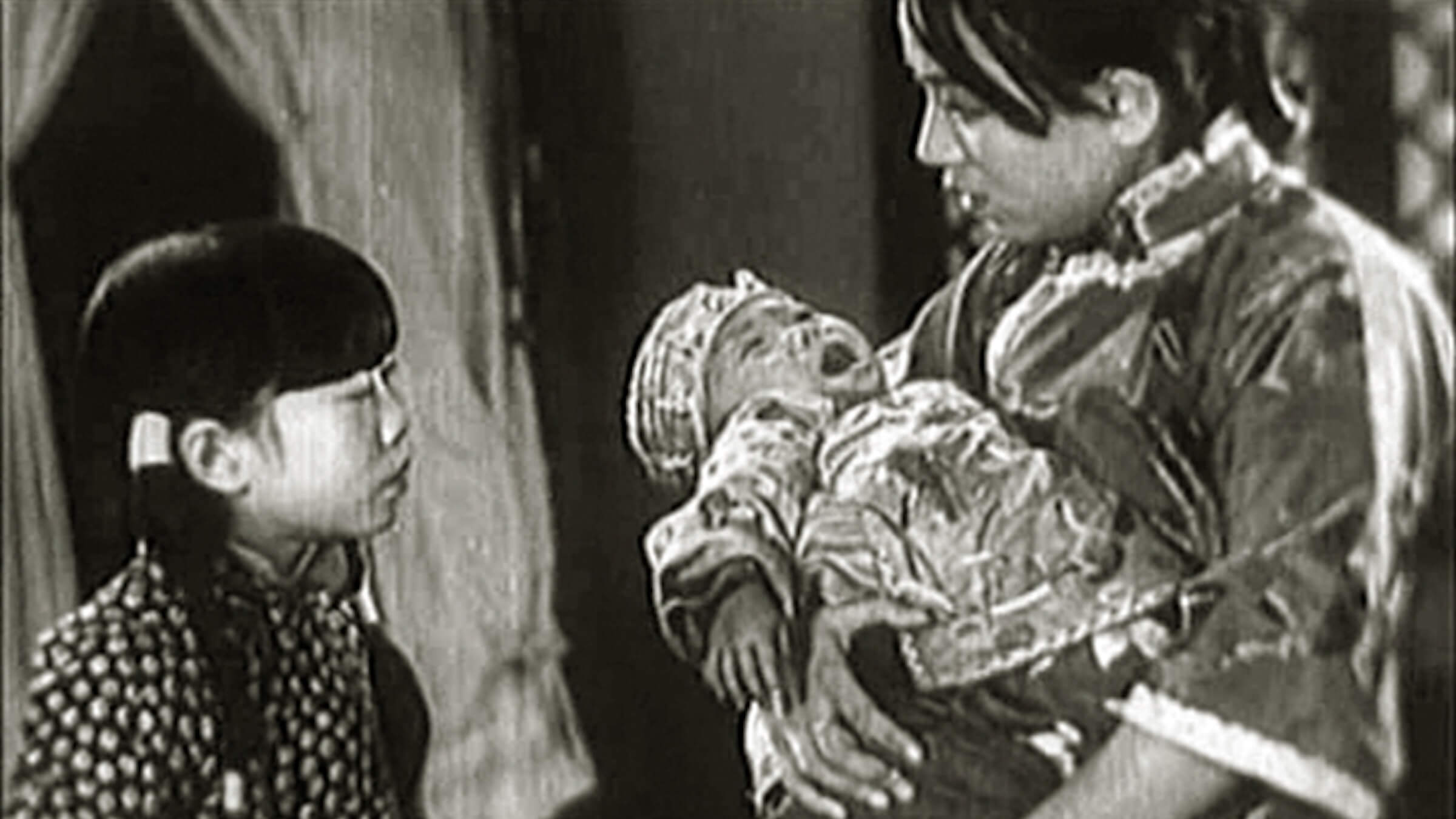Wang Renmei’s star was rising fast. Her first film appearance in 1931 had ended up on the cutting room floor. But within the next two years she triumphed in two films: Wild Rose (1932) and The Morning of a Metropolis (1933). Her next film turned out to be a motion picture with international implications.
This new project, developed specifically for her by director Cai Chusheng, depicts life among fishermen eking out an existence on the north coast of China. Cai asked composer Nie Er, whose “March of the Volunteers” became China’s national anthem, to write a song for the film that would embody the suffering of these impoverished people. Cai, who had already directed Wang twice before, had confidence that the budding actress and accomplished singer could convey their misery. (The film was shot silent with music synched in later by the country’s first sound company.)
Thirty cast and crew traveled from Shanghai’s Lianhua Studios to Shipu Village in Xiangshan County in eastern Zhejing Province. Shipu was a fishing village in decline, far from any cosmopolitan comforts. The group settled into two inns that did not have electricity and were infested with large insects. Originally, the plan was to film there for one week, but shooting ended up lasting more than a month.
The location presented many other problems. Cai could only procure a small fishing boat, which, because of its size, bumped and jolted in the water. Many actors had motion sickness and the cameraman vomited so much that he could not work. It rained most days and the inn that housed the cast had thatched roofs that leaked, worsening the already fetid living conditions. Some scenes had to be shot despite pouring rain.
The group was also bullied by the town’s ruling elite. Shortly after the film crew arrived, local officials from Chiang Kai-shek’s Guomindang held a reception, inviting the town’s gentry as well. When it became clear that the real purpose of the gathering was for the troupe to entertain the local swells, the actors had no choice but to perform. Some of the “big shots” made it clear that they had come for the actresses.
Wang Renmei, who was 19 and in excellent physical condition, was able to endure the discomforts of the experience because of her natural resilience and training. Daughter of a math professor who had taught a young Mao Zedong in Hunan province, Wang excelled in sports and, beginning at age 14, trained as a singer and dancer, enrolling first at the Meimei School for performing arts. After traveling with the Bright Moon troupe on a tour of southeast Asia, she was cast in her first film, Double Stars Shining in the Milky Way (1931). Luo Mingyou, head of Lianhua, had seen the group perform and incorporated it into his motion picture studio, changing its name to the Lianhua Singing and Dancing Troupe. Even though her part was cut from the final release, Wang Renmei had made an impression on one of the studio’s leading directors, Sun Yu, who later cast her as the headstrong girl full of vigor in Wild Rose.
As Little Cat in Song of the Fishermen, Wang Renmei plays twin sister to a boy named Xu Xiaohou, or “Little Monkey.” These are the nicknames of the children of a fisherman who dies at sea after being forced to pay rent to the village’s “Fishing King.” The twins’ mother is forced to become a wet nurse to the Fishing King’s son and the children all grow up together. When the seaside village is pillaged by pirates, the Xu children and their now-blind mother end up in Shanghai, singing for money on the docks. The Fishing King’s son also goes to Shanghai to study, and the film follows the children as their lives diverge because of class differences.
In preparation for her role, Wang Renmei learned to paddle a boat, practicing until her arms were sore and swollen. She saw firsthand how the local gentry bullied the locals and her fellow cast members. What she experienced helped her understand the inner world of Little Cat. She said that living among the fishermen and observing their lives, she developed a more complete understanding of their condition. In her previous role in Wild Rose, she basically played herself, but for Song of the Fishermen she created a new character.
Cai Chusheng and composer Nie Er, who had gone along for songwriting inspiration, had to keep the production team together through all the hardships. The cast and crew bonded with the local fishermen and had long conversations with them. The fishermen recounted how the town’s officials lowered the price of fish and how poverty cost the lives of their children. Wang Renmei recalled in her memoir that she was moved to tears. Nie Er also played a small role as a fisherman in the film, performing despite being ill with a high fever. He even insisted on a retake of his first scene, and his work ethic inspired the cast and crew to give their best despite the difficulties on location.
When Wang Renmei performed the title song for the Shipu villagers, they were deeply moved. Nie Er also taught the villagers the theme song from another of his films, The Big Road, in production at the same time, with Wang’s beau, film star Jin Yan, in the leading role. Nie went on to work with several villagers to form a troupe called “Big Road.” Three members of that group later followed the Communists and played a role in the propaganda campaign against the Japanese who had invaded Manchuria in 1931, provoking a protracted war with China.
Back in Shanghai during the final production phase of Song of the Fishermen and Big Road, Wang and Jin Yan decided to marry, and, later, the couple’s films were both commercial successes. Wang became recognized on the street, her fans giving her the affectionate nickname “Wildcat.” She was uncomfortable with the publicity and tried to keep a low profile. The civil strife between the Communists and Guomindang as well as the ongoing conflict with Japan had a devastating impact on the couple’s lives and careers. She and Jin costarred in a play written by their radical friend Tian Han. Arrested by the Guomindang and sent to Nanjing, Tian was held until Jin and Wang traveled there and were able to secure his release. By this time, most of the studios in Shanghai had closed down and these movie stars were forced into an itinerant kind of life, fleeing to Hong Kong on one occasion. Their marriage did not last and they divorced after a long separation. Wang Renmei appeared in 18 other films after Song, and her career ups and downs included a stint as an English-language typist at a U.S. military base.
Song of the Fishermen, however, ensured Wang Renmei’s place in Chinese cinema. The studio entered the film into competition at the 1935 Moscow International Film Festival, where it won an honorary prize, the first Chinese production to garner an international award.
Presented at SFSFF 2014 with live music by Donald Sosin

